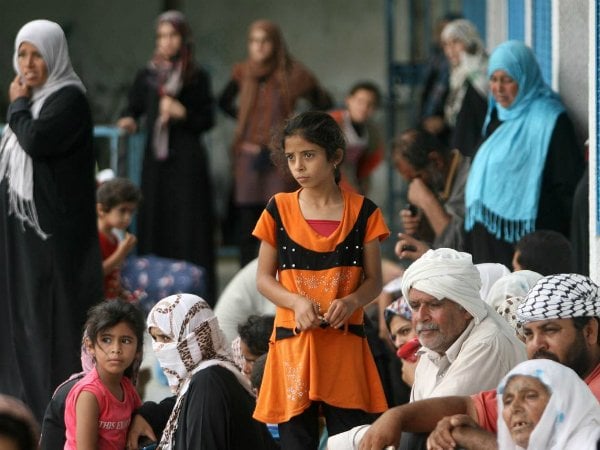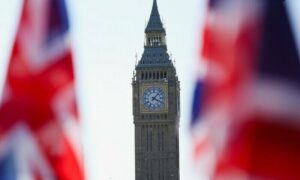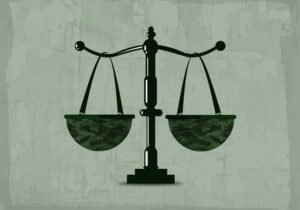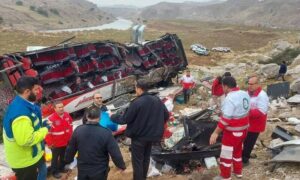GAZA:
The UN agency for Palestinian refugees was under pressure after staff members were accused of participating in the October 7 attacks, while fighting in Gaza sent more people fleeing south towards the Egyptian border.
Israeli Foreign Minister Israel Katz called for Philippe Lazzarini, the head of the UN agency for Palestinian refugees, UNRWA, to quit over the deepening row and several countries suspended funding.
The agency said on Friday it had fired several employees over Israel’s unspecified accusations and promised a thorough investigation.
“Mr Lazzarini please resign,” Katz said on social media platform X late on Saturday in response to a post by the UNRWA chief warning that the funding cuts meant the agency’s operation in Gaza was close to collapse.
Katz said earlier that UNRWA “must be replaced with agencies dedicated to genuine peace and development” in the rebuilding of Gaza after the territory’s bloodiest war.
Donors including Germany, Britain, Italy, Australia, and Finland on Saturday followed the lead of the United States, which said it had suspended additional funding to the agency over the accusations.
Hamas slammed Israeli “threats” against UNRWA on Saturday, urging the United Nations and other international organisations not to “cave in to the threats and blackmail”.
The Israeli military’s offensive in response to Hamas’ October 7 attacks has killed at least 26,257 Palestinians, most of them women and children.
Protesters call for a ceasefire in the Israel-Hamas war as they demonstrate outside the home of US Secretary of State Antony Blinken in Arlington, Virginia, on January 27, 2024. PHOTO: AFP
The resistance group’s October 7 attack had resulted in about 1,140 deaths of Israeli settlers.
The fighters also seized about 250 hostages and Israel says around 132 of them remain in Gaza, including the bodies of at least 28 dead captives.
Long-strained relations between Israel and UNRWA deteriorated rapidly after the UN body condemned tank shelling it said had hit a shelter for displaced people in Gaza’s main southern city of Khan Yunis on Wednesday.
It said tens of thousands of displaced people had been registered at the shelter and that the tank shelling killed 13 people.
The Israeli military has promised a thorough review but has also said it was examining the possibility it was a “result of Hamas fire”.
Its military campaign is now centred around Khan Yunis, the hometown of Hamas’s Gaza chief Yahya Sinwar, where it said on Saturday numerous militants were killed.
Read Security Council to meet after UN top court’s Gaza ruling
There were heavy clashes overnight in and around Khan Yunis, including mortar rounds fired by militants at Israeli tanks, Hamas and Islamic Jihad’s armed wings said.
Rockets were also fired into southern Israel, they said, and there was fighting in several neighbourhoods of Gaza City and further north.
At least 129 people were killed in Israeli strikes overnight, according to the Hamas-run health ministry, which described the health crisis in the besieged territory as “catastrophic”.
Israeli Prime Minister Benjamin Netanyahu, who is facing growing domestic pressure over his handling of the conflict, doubled down on his vow to eliminate Hamas from besieged Gaza.
“If we don’t eliminate Hamas terrorists… the next massacre is only a matter of time,” he said in a televised statement on Saturday.
Experts have told AFP that Netanyahu’s steadfast promise to eliminate Hamas is increasingly seen within his war cabinet as incompatible with returning the hostages held in Gaza.
Protesters carrying posters of the hostages and banners calling to “bring them home” gathered again in Israel’s commercial hub Tel Aviv on Saturday, as well as near Netanyahu’s residence in the upscale coastal town of Caesarea.
The row between Israel and UNRWA follows the UN’s International Court of Justice ruling on Friday that Israel must prevent possible acts of genocide in the conflict, and allow in more aid.
The UN Security Council will meet on Wednesday to give “binding effect” to the decision, which stopped short of calling for a ceasefire.
Diplomatic efforts to find a solution have also gathered pace.
CIA chief William Burns is to meet his Israeli and Egyptian counterparts, as well as Qatar’s prime minister, in Paris soon to seek a ceasefire, a security source told AFP.
A week-long cessation of hostilities in November saw Hamas release dozens of hostages in exchange for Palestinian prisoners held by Israel.
The New York Times said on Saturday that US-led negotiators were getting closer to an agreement under which Israel would suspend its war in Gaza for about two months in return for the release of more than 100 hostages.
Quoting unidentified US officials, it said negotiators had developed a draft agreement that would be discussed in Paris on Sunday.
Palestinians are fleeing further south from Khan Yunis towards Rafah, close to the Egyptian border, where the United Nations says most of Gaza’s estimated 1.7 million displaced people have gathered.
Many of the displaced live in the street amid “conditions of desperation conducive to a complete breakdown in order”, said Ajith Sunghay of the UN Human Rights Office.
AFP images showed people wading through ankle-deep water around plastic shelters in Rafah, where bombardment still threatens.
The Doctors Without Borders (MSF) aid group has said surgical capacity at the Nasser Hospital in Khan Yunis was “virtually non-existent”.
The Palestinian Red Crescent Society said the Al-Amal hospital was also “under siege with heavy gunfire”.







